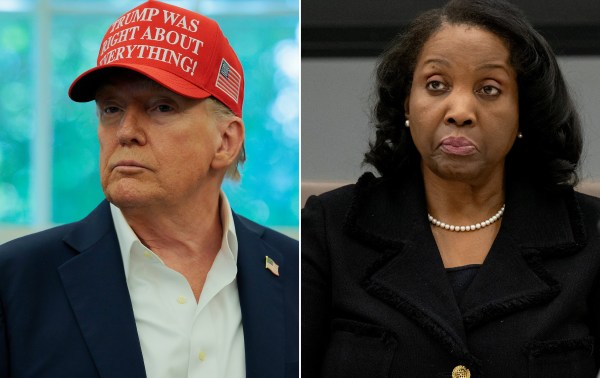“What is the point of being a Republican senator?” one of my editors asked this morning.
It was a rhetorical question.
The remark was inspired by news that former New Hampshire Gov. Chris Sununu won’t run for Democrat Jeanne Shaheen’s Senate seat next year. Sununu is the most formidable Republican in his left-leaning state, having been elected to the governorship four times. And Shaheen is retiring, forfeiting the advantage of incumbency that her party would otherwise enjoy.
The GOP was so frantic to recruit him to run that Donald Trump did something he almost never does to boost the effort. He put aside his pride, forgave Sununu for backing Nikki Haley in last year’s Republican presidential primary, and endorsed him preemptively. “I support him fully. I hope he runs” for Shaheen’s seat, the president told reporters on Sunday. “He’s been very nice to me over the last year or so, but no, I hope he runs. I think he’ll win that seat.”
No thanks, Sununu said Tuesday. “It’s not for me,” he explained in an interview. “I talked to the White House this morning. I talked to Tim Scott [the head of the National Republican Senatorial Committee]. Thanked him for all their support and confidence. But I don’t have to be the candidate, and I’m not going to be the candidate.”
“I don’t have to be the candidate” is interesting phrasing. It’s what you’d say when refusing an unwelcome burden. “We’d like you to be our nominee for Senate” doesn’t normally draw the sort of vaguely offended you-can’t-make-me response that, say, being asked to volunteer for jury duty would.
But we all know why he reacted that way. Never mind what the point is of being a Republican senator; what is the point of even trying to be a Republican senator right now, especially if you live in a bluish state?
Sununu knows what markets have looked like since “Liberation Day.” Presumably he’s seen the polling on tariffs. I’m sure he noticed the mass protests across the country last weekend and recognized that Democratic anger at Trump’s policies will only grow hotter. Running for Senate in that climate would have meant flinging himself into a midterm wood chipper, potentially crushing his reputation as an electable swing-state Republican with crossover appeal.
He doesn’t “have to” do something as silly as that, so he isn’t going to. Somewhere right now in Georgia, Gov. Brian Kemp might be thinking the same thing.
In fact, one wonders if the president’s endorsement last weekend was a sly way of driving his frenemy Sununu out of the race, a clever bit of payback for the Haley endorsement. The only thing that can make a Republican candidate less appealing to Democratic voters at this point is having Trump’s full confidence and support, and Trump presumably knows it. Now carrying the stigma of the president’s approval, Sununu decided not to bother. He likely would have lost.
And that was the best-case scenario. The worst-case scenario would have been if he’d run and … won.
Why would he or anyone else want to be a Republican senator? It must be the worst job in politics now.
Power outage.
There are two reasons theoretically to want to join the Senate. One is that it gives you influence over the direction of federal policy and veto power over which presidential nominees will staff the executive branch and the courts. The other is that it raises your political profile nationally and grants you a bit of instant credibility as a potential presidential candidate.
What’s left of those theoretical benefits in a party dominated by Donald Trump?
Only rarely anymore do Senate Republicans defy the president’s wishes and never when the chips are down. They convinced him to withdraw Matt Gaetz’s nomination for attorney general but otherwise rubber-stamped what must have been the most embarrassing slate of Cabinet nominees in American history. The budget bill they’ve proposed, which amounts to a Trump wish list, could add nearly $6 trillion to deficits over the next 10 years. When they do show a little spine by resisting his worst policies, they do so safe in the knowledge that it won’t amount to anything because their Republican colleagues in the House won’t dare follow their lead.
If you take conservatism seriously, as Chris Sununu seems to, why would you want a job with no actual power that requires you to betray conservatism day after day after day? A conservative in the House at least gets to hide his shame in a crowd of 435 members. (Unless he’s the speaker, of course.) In the Senate, the betrayal is more in the open.
Republican senators from deep-red states can rationalize slavish obedience to Trump on grounds that it guarantees them reelection and airtime on Fox News. But Sununu, the purple-stater from New England, would be stuck in the same political straitjacket as Maine’s Susan Collins, needing to break with the president sporadically to satisfy Democrats back home while siding with him often enough to placate the pro-Trump base in his own party. There would never be a “comfortable” vote for Sununu the way there routinely is for the likes of Ted Cruz and Mike Lee.
Being a Republican senator in 2025 also means forever being one moment away from having to manage a stupid, avoidable, and possibly unprecedented crisis resulting from Trump being either a fascist or a dope or both. Instead of crafting tax policy or debating how to contain China, Sen. Sununu would be faced with issues like: What should the Senate do if Trump suddenly orders a military invasion of Greenland? If he starts deporting American citizens to El Salvador because he dislikes their politics? If he slaps an 8,000 percent tariff on the European Union? If he ignores a Supreme Court ruling and declares that judicial review is null and void? If he orders U.S. troops to open fire on a group of protesters?
The new lawmaker from New Hampshire would spend more time at odds with the leader of his party than with his colleagues on the other side, and no matter where he landed in each Trump-driven crisis, roughly half of his constituents back home would be incandescently furious at him. Who wants a job like that?
The only reason he might consider putting up with it is that a Senate seat might boost his presidential prospects. Sununu considered running in 2023 before passing, but at 50, he’s a young man by political standards and would have an enviable record of success in a swing state if he won Shaheen’s seat. Becoming a senator would instantly place him in the conversation for 2028—in theory.
But not in practice. C’mon.
There are too many people ahead of him in line. Trump himself wants to run for president again. If the 22nd Amendment makes that impossible, J.D. Vance is the presumptive heir apparent. But if populists find Vance uninspiring, they’ll turn to Donald Trump Jr. or Tucker Carlson—or Elon Musk, if he can figure out a way around the “natural-born” requirement in the Constitution. If he can’t, he’ll probably use his limitless fortune to try to play kingmaker in the primary. Does anyone expect a postliberal demagogue like Elon to throw his financial weight behind … Chris Sununu?
It’s hard to imagine the next Republican presidential nominee winning the primaries without the approval of Trump himself, and Trump certainly won’t back a conservative who backed a different Republican in 2024 when there are so many sycophantic nationalist alternatives to choose from. For Sununu to stand a chance, the next four years would need to go so catastrophically badly that even the MAGA base ends up turning on Trump and clamoring for a return to conservatism—an unthinkable scenario. And even then, a figure like Kemp or Gov. Ron DeSantis would have more “hated by the right people” cred among Republican voters than Sununu would.
So there’s no reason for him to run for Senate. He’s better off staying on the sidelines for now, earning some cash in the private sector and biding his time until …
Until what?
The Haley play.
I don’t think Sununu is leaving politics for good and rebooting as a talking head, as former Gov. Chris Christie appears to have done. He was considering running for Shaheen’s seat as recently as a few weeks ago, before “Liberation Day” nuked global markets. And he’s put in too much face time on camera this year defending the Trump administration, especially Musk’s cost-slashing DOGE project, for me not to believe that he’s trying to earn brownie points with Republican voters ahead of whatever his next political move might be.
This is a guy who went on television a few weeks before Inauguration Day to predict that Trump would be “much smarter” in his second term than in his first, despite knowing that the president would be surrounded by cretins this time and bent on “retribution” against every enemy, real or imagined. No sensible person believed sincerely that Trump 2.0, which just this past week launched the dumbest trade war in history, would be an improvement over Trump 1.0. The only reason for Sununu to have said such a thing is because he was hoping to gain some political goodwill that he could leverage later.
I suspect he’s placing a wager on 2028 similar to the one that the candidate he endorsed last year made on 2024.
Nikki Haley believed that eight years of Trump coup plots, criminal indictments, and “mean tweets” had made Republican voters quietly receptive to an alternative, especially following the disappointment of 2020. Sununu believed it too: In August 2023 he published an op-ed in the New York Times arguing that the former president would lose if, unlike in 2016, the Republican primary field narrowed quickly.
Well, it did narrow quickly. Ron DeSantis quit the race after Iowa. Haley ended up in a de facto one-on-one death match with the frontrunner. And she got smoked.
Haley’s theory was that Republicans were tired of Trump. Sununu’s new theory, I’m guessing, is that Republicans are tiring of Trumpism and will finally feel free to show it once the president who commands their loyalty is no longer appearing on any ballots. “Trump is extremely unique,” he told Politico in January. “There’s no ‘Trump lite’ or ‘Trump 2.0’ that can replace or replicate what he’s brought to the table, for better or for worse.”
And there’s truth to that, no? We were reminded again just last week in Wisconsin that Trumpism without Trump isn’t so scary at the polls.
In 2028 the 22nd Amendment will put the president out to pasture. (Hopefully!) When it does, Sununu may believe, the cultish, populist dynamic on the right will ease and conservatism will become competitive again as the GOP’s dominant ideology. Four years of being mugged by protectionist economic reality will lead Republican voters to give Reaganites a fresh look.
Not a presidential look, perhaps—in America, it’s hard for a candidate who doesn’t hold public office to win the White House unless he’s a game-show host. But 2028 happens to be when the other Democratic senator in New Hampshire, Maggie Hassan, is up for reelection. Republican turnout will be high that fall because it’s a presidential year and, after eight years of “woke” leftism and nationalist radicalism, old-school conservatives might plausibly land in the sweet spot for swing voters. Sununu would stand a better chance of challenging and beating Hassan than winning in what’s likely to be a harshly Democratic national environment next fall, I think.
And because we’ll have a new president (again, hopefully), being a Republican senator in 2029 will be more enjoyable than being one in 2027. If a Democrat is in the White House, Sen. Sununu will have an easy target for political criticism to keep GOP voters back home happy, and numerous opportunities to partner with liberals on legislation to satisfy the blue majority in his home state. If instead a Republican succeeds Trump, that Republican certainly won’t command anywhere near the fanatic loyalty that Trump currently commands on the right.
GOP senators will be able to politely oppose the president again without being besieged with death threats from their own base. Imagine.
So it’s settled: 2028 is the year of the conservative (and Sununu) comeback! Do you buy that?
I do not.
Personality transplant.
I can believe that Sununu will run for Senate and defeat Hassan in 2028, but an ideological comeback for conservatism on the right is unlikely. Just as no man ever steps into the same river twice, there’s been too much flux in the Republican coalition for a near-term Reaganite revival. Partly it’s a matter of demographics: GOP leaders won’t want to lose the working-class voters Trump brought into the party in 2024 by pivoting back to libertarian-ish fiscal and social views.
And they won’t want to alienate millions of young Republicans who’ve grown up believing that Trumpism is the essence of what it means to be right-wing. How do you persuade twentysomethings who wish to wield government as a club against the libs to support figures like Sununu who aim to make that club as small and harmless as possible?
Trump’s movement is devoted less to a policy agenda than to an ethic of ruthlessness toward one’s cultural enemies that he personifies. If he turns around tomorrow and rescinds his “Liberation Day” tariffs, most of his voters will be fine with it because they don’t ultimately care about tariffs or trade. They care about him hurting the people he needs to be hurting and have absolute confidence that he’ll continue to look for ways to do that even if he retreats from a particular proposal.
Which is a long way of saying that, to nominate someone like Kemp or Sununu in 2028, the party wouldn’t merely need an ideological change of heart. It would need a personality transplant. Its idea of American politics would have to shift from a tribal war between red and blue for total, durable domination to a more pluralist model of making it easier for individuals on all sides to maximize their own welfare. That’s implausible.
And then there’s the problem of face-saving.
Trump himself proved in 2016 that, even in a presidential primary, a party’s voters might be receptive to criticism of a leader whom they once adored. He criticized George W. Bush over the Iraq war and immigration and paid no penalty for it. In theory the same dynamic could work in reverse in 2028.
But Republican voters were eight years removed from the Bush presidency when Trump made his critique. The emotional and political investment they had made in Dubya was long over by then. Had Trump run in 2008 instead and made the same arguments against the then-sitting president, I don’t know if primary voters would have seen it as a “breath of fresh air.” They might have regarded it as a terrible betrayal by a so-called Republican making the same attacks on poor President Bush as the hated Democrats routinely had for eight years
The right is going to need a similar distance from Trump, I expect, before anyone dares say on a debate stage that the moronic spectacle of “Liberation Day” was, in fact, moronic. Republican voters might eventually be willing to admit that they made a terrible mistake, but it won’t be in 2028. Think 2032 or 2036. Maybe 2040, when the next generation of young right-wing voters is considering its ideological options.
Not until we’ve endured a good 10 or 15 years of populists scapegoating others for Trump’s failures in order to save face will the right be ready for a serious reckoning with what it’s done.
Tough break for Chris Sununu, who, if I’m correct, won’t have even a faint chance of becoming a serious presidential contender until he’s in his mid-60s. But he does stand a real shot of landing the worst job in Washington before then. Good luck to him.









Please note that we at The Dispatch hold ourselves, our work, and our commenters to a higher standard than other places on the internet. We welcome comments that foster genuine debate or discussion—including comments critical of us or our work—but responses that include ad hominem attacks on fellow Dispatch members or are intended to stoke fear and anger may be moderated.
With your membership, you only have the ability to comment on The Morning Dispatch articles. Consider upgrading to join the conversation everywhere.